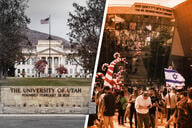You have /5 articles left.
Sign up for a free account or log in.

Fewer than half of campuses in a new study had religious accommodation policies.
Dimensions/E+/Getty Images
A recent study of 122 colleges and universities found that fewer than half of them have religious accommodation policies for students, and that most policies that do exist aren’t especially comprehensive.
The study sample included a wide variety of institutions—public and private, rural and urban, secular and religiously affiliated of different sizes, and from different regions of the country.
College students from religious backgrounds that require scheduled prayer time, dietary restrictions or specific holiday rituals often have to request accommodations to meet their religious obligations. But classes, exams and graduations often fall on holidays observed by these students. Kosher or halal food isn’t always easy to come by in dining halls, and finding both time and a physical space for daily prayer on campuses can be a challenge.
The study, conducted as part of a dissertation by a North Carolina State University doctoral student this spring, found that just 55 of the 122 campuses, 45.1 percent, had publicly visible religious accommodation policies. Those policies were more common at public institutions; about 81 percent of them had these policies compared to 58.1 percent of private, nonsectarian universities. They’re even less common at Christian institutions. Fewer than a quarter of Protestant- or Catholic-affiliated colleges and only 6.6 percent of evangelical institutions had religious accommodation policies.
Of the policies that existed, fewer than a quarter applied to religious needs outside the classroom, such as dietary restrictions, prayer spaces or accommodations related to campus housing. And fewer than half of the policies outlined any kind of appeals process for a denied request. Only five institutions had a dedicated committee or staff member for processing requests.
These findings are “concerning” to Gordon Maples, author of the dissertation and a recent graduate of the higher education opportunity, equity and justice doctoral program at N.C. State.
Maples said his interest in this issue stemmed from repeatedly watching students struggle to get their religious needs met over the years. For example, when he worked at Vanderbilt University’s Office of Religious Life as a master’s degree student, the campus newspaper published a 2018 op-ed detailing how a Jewish student tried, and failed, to get permission from professors to miss classes during the High Holidays.
“We want students to be their whole selves when they’re at our institutions,” Maples said. “We don’t want to have them compromise a part of themselves and have to make the choice between observing an important religious holiday or following their dietary needs according to their religion and being able to participate in their classes or having to sacrifice their grades potentially.”
He added that students from Protestant Christian backgrounds rarely face the same difficult choices.
Colleges and universities at least appear to be more accommodating of students’ religious needs in recent years. For example, Emory University in Atlanta introduced a new policy last August that details how students and employees can request accommodations for religious observances. Michigan State University revised and broadened its policy this spring. Various campuses have made adjustments for Muslim students fasting during Ramadan, including holding alternate exams at night after students break the fast. The U.S. Department of Education is also focusing on the issue by hosting an event on Tuesday about “inclusion, rights and accommodations for students of all faiths and none,” from preschool through college.
Reverend Gregory McGonigle, dean of religious life and university chaplain at Emory, said the number of students belonging to non-Christian faith traditions has increased on campuses across the country, including at his institution, where accommodations requests have risen as a result.
“Emory seeks to support a diverse and inclusive student population, so the policy is an important tool to ensure we create the most equitable academic environment possible,” McGonigle said.
The new policy includes an appeals process, which is particularly important to him “because it can open up a dialogue about how best to provide an accommodation.”
Jenny Small, associate director of the Jack, Joseph and Morton Mandel Center for Studies in Jewish Education at Brandeis University, said it’s hard to tell if these policies are on the rise, because there’s so little research on them. Small, who has written extensively about religious pluralism on campuses and who co-authored a paper with Maples and served on his dissertation committee, said campus religious life is generally understudied.
“People don’t really know how to dig into questions about religion,” she said. “There’s a lot of taboos in our society about talking about religion.”
Charles J. Russo, Joseph Panzer Chair in Education and research professor of law at the University of Dayton, a Catholic institution, said he expects higher ed leaders to pay more attention to these policies after a recent, unanimous U.S. Supreme Court decision in favor of a Christian postal worker who refused to work on Sundays.
“I think it’s gonna open the door to more awareness,” he said.
A Common Problem
Multiple states have laws requiring public colleges and universities to allow various religious accommodations in response to repeated complaints from religious students.
An Ohio bill signed into law this year requires public colleges and universities to give students a minimum of three excused absences and other accommodations to observe religious holidays, if students notify professors early in a course. A new law in Maryland, which went into effect this month, requires public institutions to develop religious accommodation policies publicly available to students. The policies must have an appeals process and address the need for campus spaces for religious activities and include excused absences and accommodations for assignments and exams on holidays. Washington State and Utah also adopted religious accommodation laws in 2019 and 2021, respectively.
Zainab Chaudry, director of the Maryland office of the Council on American-Islamic Relations, a Muslim civil rights and advocacy group, said the organization pushed for the Maryland legislation after fielding complaints from Muslim students for years. Students told her they weren’t allowed to miss class or make up exams that fell on Eid or their requests for designated campus prayer spaces were denied, forcing them to do their five daily prayers in building stairwells or other less-than-ideal spots on campus.
She said Muslim students also worried that making accommodation requests could affect their grades or their relationships with professors and classmates because of Islamophobia.
The law “places that responsibility on the administrations to take that initiative to provide those accommodations to students in a way that students don’t necessarily have to feel like they could be singled out or that they could potentially deal with consequences or retaliation if they were to assert their beliefs,” she said.
Julia Jassey, co-founder and CEO of Jewish on Campus, a national Jewish student advocacy group, said conflicts between academic calendars and Jewish holidays are “really, really common” and particularly challenging for Orthodox Jewish students who don’t work or use electronic devices on Shabbat and holidays. She noted that the High Holidays occurring during September and October, usually the beginning of the academic year, puts first-year students in the awkward position of having to request class time off from professors they hardly know, sometimes even on the first day.
“A lot of students don’t even know if the university does have a policy,” she said. “Especially freshmen … wouldn’t even know how to access whatever policy the university might or might not have. And a lot of the time professors don’t even know.”
Maples believes this lack of communication may explain why his research showed non-Christian students didn’t necessarily perceive campuses with these policies as more welcoming or inclusive. The study draws on data from the Interfaith Diversity Experiences and Attitudes Longitudinal Survey, or IDEALS, a study based on student surveys at the 122 institutions, overseen by researchers at North Carolina State and Ohio State University. Maples also did five case studies on institutions that were “exemplars” of religious inclusion, where high rates of non-Christian students reported they felt welcomed and had “spaces for support and spiritual expression.” He also found that other factors, such as having courses, research centers and speakers focused on religion or interfaith programming, were more likely to make non-Christian students feel at home.
These policies are often “buried and pretty deep” on university websites, “so when you’re looking at the public perception of the students of their institutions, if they never see the policy, then that might not be affecting how they view things,” Maples said.
Noah Silverman, senior director of learning at Interfaith America, an organization that promotes interfaith collaboration, including on campuses, said it’s important for institutions to not only have visible policies but ensure they’re broad enough to encompass unforeseen challenges.
“I think the policies ought to be enforceable in such a way to know that even if this thing that you’re requesting or that we need doesn’t exist now, we are committed institutionally to providing it,” he said.
“We like to joke that there are [as] many different religious traditions on the planet as there are people, so you can’t actually address all of them or plan for all of them,” he added. “But what you can do is develop a posture or a stance of … we want to be in conversation with you to make sure that your needs are being met.”
Silverman also noted that these policies are basic safeguards intended to address “when things go wrong, or when there’s some sort of tension” between a religious practice and day-to-day college life.
Maples said state laws are a valuable step to establish what “base-level” accommodations should be, but institutions are still responsible for ensuring their policies are appropriately broad and robust, and that they are well publicized and outline clear paths for students to make requests by using an online form, for instance, or contacting a designated staff member, without feeling intimidated.
He hopes higher ed leaders take away from his research that “there are honestly even small changes that can be made that can have a really big impact,” and these policies “signal that they see those students and that they value their perspectives.
“Students are dynamic, whole people who are combinations of identities—and religion and spirituality is part of it,” he said. “Someone’s background does affect the way that they experience the world, the way they view the world, the way they experience our campuses.”





